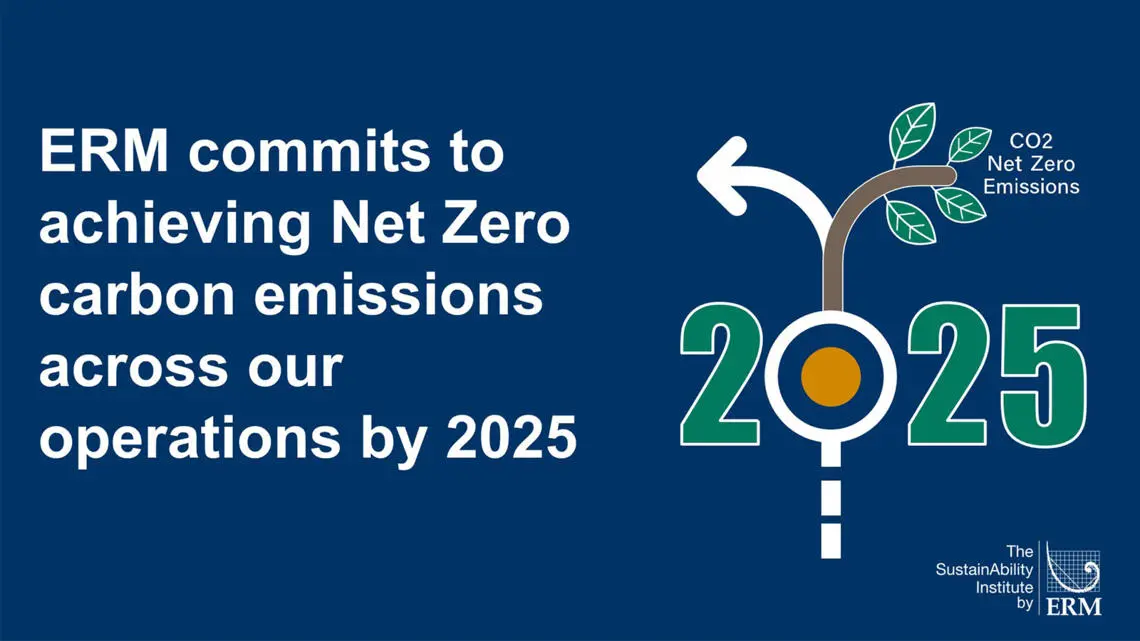Authors
WBCSD Communications
To mark this Earth Day, ERM is announcing its commitment to achieving net zero carbon emissions across its operations by 2025.
ERM will underpin this commitment by strengthening its existing science-based target for emissions reductions to a 1.5 degrees Celsius aligned target.
Speaking of this commitment, ERM CEO Keryn James said, “As the largest pure-play sustainability advisory business, it is important that we set an ambitious net zero target that covers all of our operations. ERM was one of the first professional services companies to set a target approved by the Science Based Target initiative in 2019. Given the important role that business has to play in achieving the ambition of the Paris Agreement, we are continuing to take a leadership position in this effort – and are encouraging our clients and peers to do the same.”
Abating operational emissions
With this ambitious target, ERM will address its direct and indirect emissions (known as Scope 1 and 2) by moving to 100 percent renewable energy across the global portfolio of its offices this year, and further reducing emissions across its vehicle fleet.
Value chain emissions (known as Scope 3) will be addressed primarily through a focus on reducing business travel. This year, organizational travel budgets have been reduced by 50 percent and a new travel policy is being implemented. Emissions from employee commuting will be addressed through reviewing office locations and rolling out incentive schemes to encourage lower carbon commuting options.
For the past decade, ERM has set greenhouse gas (GHG) reduction targets and reported annually on its GHG emissions. Over this time, the focus has been on abating scope 1, 2 and 3 emissions across operations and through engaging employees to identify and deliver GHG emission reduction activities across 160 offices in more than 40 countries.
Residual carbon emissions
While all efforts will be made to reduce emissions, ERM anticipates that in 2025 there will be residual carbon emissions, largely related to travel by employees.
ERM will draw on its extensive pool of subject-matter experts as well as emerging best practices to develop a robust and comprehensive plan to address any residual emissions. This includes carbon removal and reduction as well as contributions to biodiversity and livelihoods. This plan will be announced in the current financial year (ending March 2022).
An active leadership role
For many years, ERM has actively contributed towards the transition to a low carbon economy through a range of global initiatives:
- ERM is a signatory to the Climate Pledge, a global commitment to take urgent action to meet the Paris Agreement by 2040.
- ERM is a signatory to the UN Global Compact-led Business Ambition for 1.5 degrees Celsius, an advocacy campaign calling on businesses to do their part to limit global temperatures from rising.
- ERM is a member of the Race to Zero campaign as part of COP26 (the 26th UN Climate Conference). The campaign aims to rally leadership and support from businesses, cities, regions and investors for a healthy, resilient, zero-carbon recovery.
- ERM’s Group CEO is a Co-Chair of the Climate and Energy Program; and Co-Vice Chair of the World Business Council for Sustainable Development (WBCSD), which ERM helped found over 25 years ago.
- ERM is a member of the Natural Climate Solutions Alliance (NCS), convened by the World Economic Forum and WBCSD to scale up affordable natural climate mitigation solutions.
Supporting clients in the transition to a net zero future
For 50 years, ERM has worked with clients who have helped deliver access to energy around the world. Contributing to the Sustainable Development Goals (SDGs) including access to affordable, reliable, sustainable and modern energy for all is a top priority for the company in this Decade of Action.
In setting out the company’s approach, ERM Executive Committee member Sabine Hoefnagel said, “ERM recognizes its client base includes companies in energy-intensive sectors that play an important role in socio-economic development at a global, regional and local level. We know our most significant impact is through the work we do with our clients and we are engaging them through a sector-based approach as the pathway to net zero looks very different from sector to sector. ERM does not only develop strategies and road maps, it is actually supporting its clients on delivering and operationalizing net zero pathways that are scientifically robust, commercially viable and technically practicable – and that meet the needs of today’s environmental, social and governance (ESG) investors.”
She continued, “We are also engaging other key stakeholders, including our employees and industry partners, on the complex and important questions of ERM’s role in the transformation that is required across business and society to deliver a net zero future.”
In recent years, the company has made significant additional investment in building capability and capacity to support client needs in the transition to decarbonize. Since 2020, a public target has been set as a demonstration of this commitment, with details of this work on the transition published in ERM’s annual Sustainability Report.
ERM has been a supporter of the Task Force on Climate-related Financial Disclosures (TCFD) since 2018. Apart from supporting numerous clients on TCFD strategy and implementation, the company has a roadmap for implementing the TCFD recommendations across its own business, with progress disclosed on an annual basis as part of its Sustainability Report. In line with this roadmap, ERM is evolving its enterprise risk management approach to respond proactively to changing climate-related risks and opportunities.
Outline

